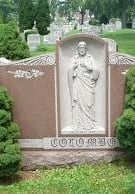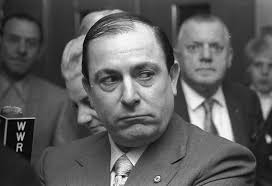

Joseph Colombo
(Colombo Crime Family)
6/16/23 - 5/22/78
Early Life:
Joseph Anthony Colombo Sr., commonly known as Joe Colombo, was born on June 16, 1923, in New York City. Raised in a traditional Italian-American family, Colombo was born into a world where the undercurrents of organized crime flowed strongly. His father, Anthony Colombo, was a member of the then Profaci crime family, which introduced Joe to the realities of mob life from a young age. The Colombo family lived in the borough of Brooklyn, a melting pot of cultures and a hotspot for the Mafia's operations during that era.
Joe Colombo's early years were marked by the influence of his father's criminal dealings. He attended New Utrecht High School in Brooklyn but dropped out early and joined the U.S. Coast Guard. In 1945, Colombo was diagnosed with neurosis & discharged from the service. Back in Brooklyn, his lack of formal education did not hinder his immersion into the Mafia's world; instead, it propelled him further into the underworld. By the time he was in his late teens, Joe was already involved in petty crimes and gradually climbed the criminal ladder.
The Path to Power:
In the 1940s, Colombo's criminal career began to take shape more definitively. His association with the Profaci crime family, one of the Five Families that dominated organized crime in New York City, was a turning point. He became one of the family's top enforcers, and soon became a capo. Under the tutelage of Joseph Profaci, the boss of the Profaci family, Colombo honed his skills and gained the trust of his superiors. His reputation for loyalty and his willingness to carry out orders without question made him a valuable asset to the family.
Throughout the 1950s, Colombo's influence within the Profaci family grew. He was involved in various illegal activities, including loan sharking, gambling, and racketeering. His ability to navigate the complex web of Mafia politics and his strategic thinking set him apart from his peers. Colombo's rise was also facilitated by the internal strife within the Profaci family. The 1960s brought significant changes, with Joe Profaci's death on June 6, 1962 leading to a power vacuum.
The Colombo Crime Family:
Following Profaci's death, longtime underboss Joseph Magliocco took over as the boss. However, his tenure was short-lived due to internal conflicts and external pressures. The infamous "Banana War" ensued, a power struggle between the Profaci family and the Gallo brothers, who had once been loyal to Profaci but rebelled against Magliocco's leadership. Colombo played a critical role during this period by aligning himself with powerful allies and maneuvering through the Mafia's volatile environment.
In 1963, the Commission, the governing body of the Mafia in the United States, forced Magliocco to step down due to his involvement in a plot against other Mafia bosses. This development opened the door for Joe Colombo to assume leadership of the family. At the age of 40, Colombo became the head of the newly renamed Colombo crime family, marking a new era in his life and the history of the Mafia. Colombo was one of the youngest crime bosses in the country. He was also the first American-born boss of a New York crime family.
Public Persona and the Italian-American Civil Rights League:
One of Joe Colombo's most significant and controversial moves as the head of the Colombo family was his decision to establish the Italian-American Civil Rights League in April 1970. This organization aimed to combat discrimination against Italian-Americans and improve their public image, but it also served as a front to deflect attention from Colombo's criminal activities. The League organized rallies and events, attracting significant media coverage and public support.
Colombo's efforts to present himself as a legitimate community leader were groundbreaking. He sought to change the narrative surrounding Italian-Americans, portraying them as hard-working citizens rather than criminals. The League's most notable achievement was the successful campaign against the use of the word "Mafia" in media and entertainment, which Colombo argued perpetuated negative stereotypes. His charismatic leadership and ability to mobilize the community made him a prominent figure in the public eye.
Challenges and Downfall:
Despite his efforts to legitimize his image, Joe Colombo could not escape the realities of his criminal life. The FBI and other law enforcement agencies closely monitored his activities, leading to several arrests and investigations. The tension between his public persona and his criminal undertakings created a precarious situation.
The turning point came on June 28, 1971, during the second Italian-American Unity Day rally in Columbus Circle organized by the League. Colombo was shot three times by Jerome A. Johnson, an African-American man with unclear motives. The attack left Colombo paralyzed, he never fully recovered and Johnson, immediately killed by Colombo's bodyguards. The shooting was widely believed to be a result of internal Mafia conflicts, possibly the bad blood between Crazy Joe Gallo & Colombo, although the exact reasons and perpetrators remain a subject of speculation.
After the Colombo shooting, Joseph Yacovelli became the acting boss for one year before Carmine Persico took over.
Although many in the Colombo family blamed Joe Gallo for the shooting, the police eventually concluded that Johnson was a lone gunman after they had questioned Gallo. Since Johnson had spent time a few days earlier at a Gambino club, one theory was that Carlo Gambino organized the shooting. Colombo refused to listen to Gambino's complaints about the League, and allegedly spat in Gambino's face during one argument. However, the Colombo family leadership was convinced that Joe Gallo ordered the murder after his falling out with the family. Gallo was murdered on April 7, 1972.
Legacy and Impact:
Joe Colombo's life and career left a lasting impact on the Mafia and the Italian-American community. His rise to power was marked by strategic alliances, a keen understanding of Mafia politics, and a willingness to innovate. Colombo's creation of the Italian-American Civil Rights League was a bold move that highlighted the complex interplay between criminal activities and community leadership.
Colombo's tenure as the head of the Colombo crime family was relatively short but highly influential. He reshaped the family's operations, navigating through internal and external challenges. His efforts to present a legitimate front through the Civil Rights League were unprecedented in Mafia history and demonstrated his adaptability and vision.
The attack on Colombo and his subsequent incapacitation marked the beginning of a turbulent period for the Colombo family. Internal power struggles and external pressures from law enforcement continued to plague the family. Colombo's successors faced significant challenges in maintaining the family's power and influence.
Death:
On May 22, 1978, Colombo died of cardiac arrest at St. Luke's Hospital (later St. Luke's Cornwall Hospital) in Newburgh, New York.
Colombo's funeral was held at St Bernadette's Catholic Church in Bensonhurst and he was buried in Saint John Cemetery in the Middle Village section of Queens.
Conclusion:
Joseph Anthony Colombo Sr. remains a significant figure in the history of organized crime in the United States. His life story is a testament to the complexities of Mafia life, where loyalty, power, and public perception intersect. Colombo's rise to power, his efforts to legitimize his image, and his eventual downfall paint a vivid picture of the Mafia's evolution during the mid-20th century.
Colombo's legacy is a blend of criminal ingenuity and a unique approach to community leadership. His ability to navigate the treacherous waters of Mafia politics and his efforts to change public perception of Italian-Americans left an indelible mark on history. Despite his criminal activities, Joe Colombo's impact on the Mafia and the broader Italian-American community continues to be a subject of fascination and study.
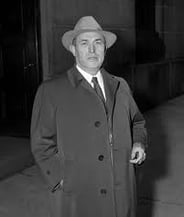

Joseph Profaci
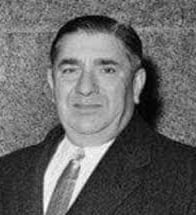

Joseph Magliocco
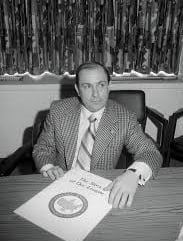

Italian-American League
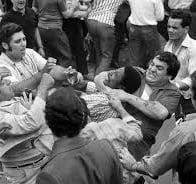

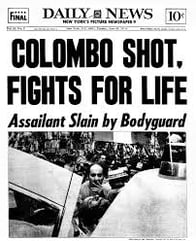

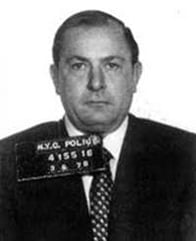



St. John Cemetery
